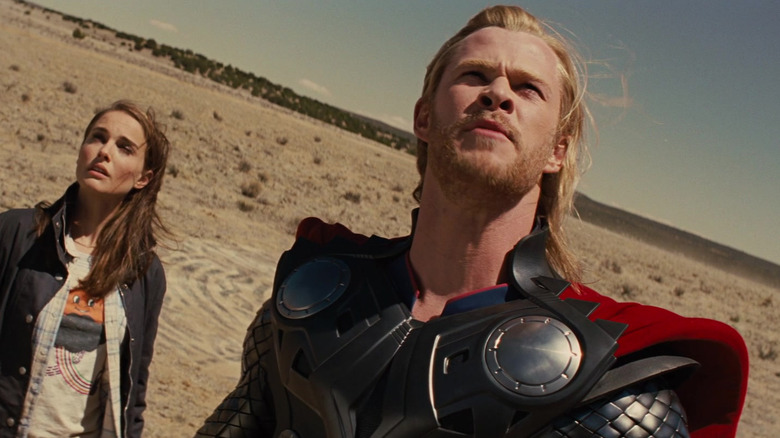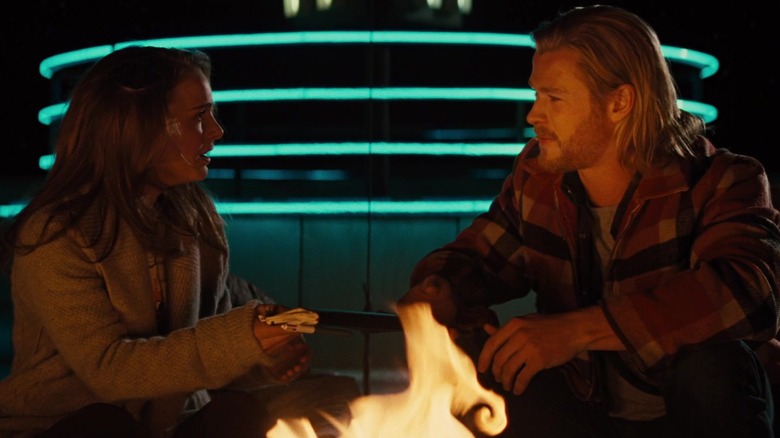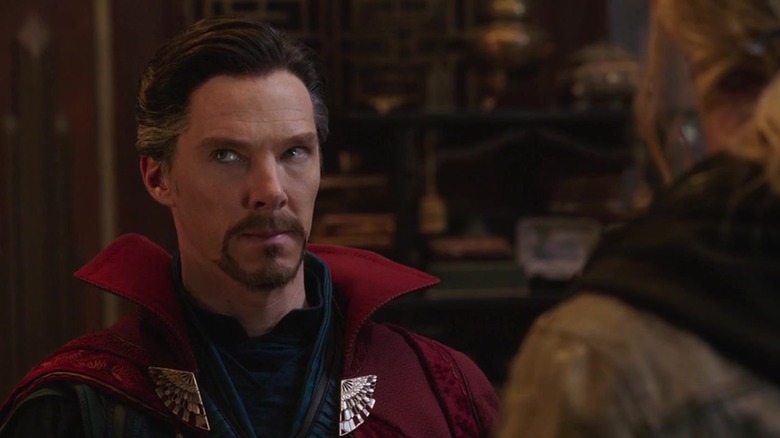An Arthur C. Clarke Mantra Influenced Marvel's Logic For The Thor Franchise
Some of the Marvel Cinematic Universe's best elements came from strange places, as any narrative of this size and scale will inevitably feature a lot of cooks in the kitchen. From James Gunn basically drafting up the lore behind the Infinity Stones on a napkin to Ryan Coogler building Wakanda in the image of Chadwick Boseman's imagination, there are too many fun anecdotes about the formulation of this grand story. Meanwhile, over in Thor's corner of the MCU, no less of an authority than Kevin Feige has revealed that Arthur C. Clarke actually provided some direct inspiration when it came to translating the God of Thunder to the big screen.
In 2011's "Thor," Thor Odinson (Chris Hemsworth) essentially crash-lands on Earth after being cast out of Asgard by his father Odin (Anthony Hopkins), only to develop a fondness for the inhabitants of what he and his fellow gods/aliens call Midgard. (Earth is one of the nine mythical Norse realms in the MCU continuity. See why Feige and Co. thought audiences could use some clarification with all the magic stuff going on here?) Along the way, Thor also meets — and falls in love with — Dr. Jane Foster (Natalie Portman) and explains to her how the magic works on Asgard, including how it overlaps with the ways technology has evolved on Earth over time. As it turns out, one of Clarke's best-known quotes served as the jumping-off point for Feige's large position on magic in the MCU, which began with "Thor" and continued into later MCU projects in unexpected ways.
Clarke's comments about technology and magic helped mold the MCU starting with Thor
Clarke's comments about technology and magic are related to his famous "three laws," and it's the third one that got Feige thinking. In Clarke's 1962 book "Profiles of the Future: An Inquiry into the Limits of the Possible," the writer argued that "Any sufficiently advanced technology is indistinguishable from magic." It's an idea that many people have paraphrased in one way or another over the years. However, when Collider interviewed Feige on the "Thor" set in 2010 and asked him about bringing so many different elements of sci-fi and fantasy into the MCU, he invoked the quote to explain how someone like Thor could end up standing alongside his fellow Avengers:
"Was it Arthur C. Clarke or [Isaac] Asimov who said, 'Technology significantly advanced would be indistinguishable from magic.' That quote is what we used a lot and continue to use with all of this. Something that looks like magic to us, but it's not magic to them. That is where we are coming from and when these worlds eventually collide, it will be in a pretty scientific manner. Not a boring scientific manner, I hope, but in a cool one."
This was absolutely a concern for many comic book fans back when the MCU was just getting started. With both "Iron Man" and "The Incredible Hulk" kicking off the franchise in 2008, most folks assumed the property would be sticking to heroes similarly grounded in science and technology for the foreseeable future. That made it all the more surprising when "Thor" arrived so early in the MCU's run. However, Feige was right, and Clarke's principle showed how the franchise's disparate ideas could all come seamlessly together.
Magic and technology going hand-in-hand has led to some of the MCU's best moments
Over the course of the MCU, there have been so many funny moments that get some of their spark from this attitude to technology and magic. Almost every Thor appearance outside of his own franchise leans into the idea of the other characters being incredulous that he's actually a god, and other magic-users like Wanda Maximoff (Elisabeth Olsen) and Stephen Strange (Benedict Cumberbatch) often get roped into this kind of bit as well. Despite some people rolling their eyes at the comedic elements in any of these movies, Sam Wilson (Anthony Mackie) joking about "The Big Three" of androids, wizards, or aliens being the source of 90 percent of the Avengers' problems gets a laugh out of folks.
As the MCU continues to expand (although it's expected to retract after "Avengers: Secret Wars"), It will be interesting to see if Marvel Studios changes things up with its approach to this property. With so many Marvel fans on social media calling for more down the line adaptations of characters like Thor, it would be easy for the MCU to portray Thor as being "magical" and leave it at that. That's a choice it's welcome to make, for sure, but there's nevertheless something charming about the idea of him being an alien with a bunch of fancy computers that look like Norse runes, as opposed to a literal space god.


